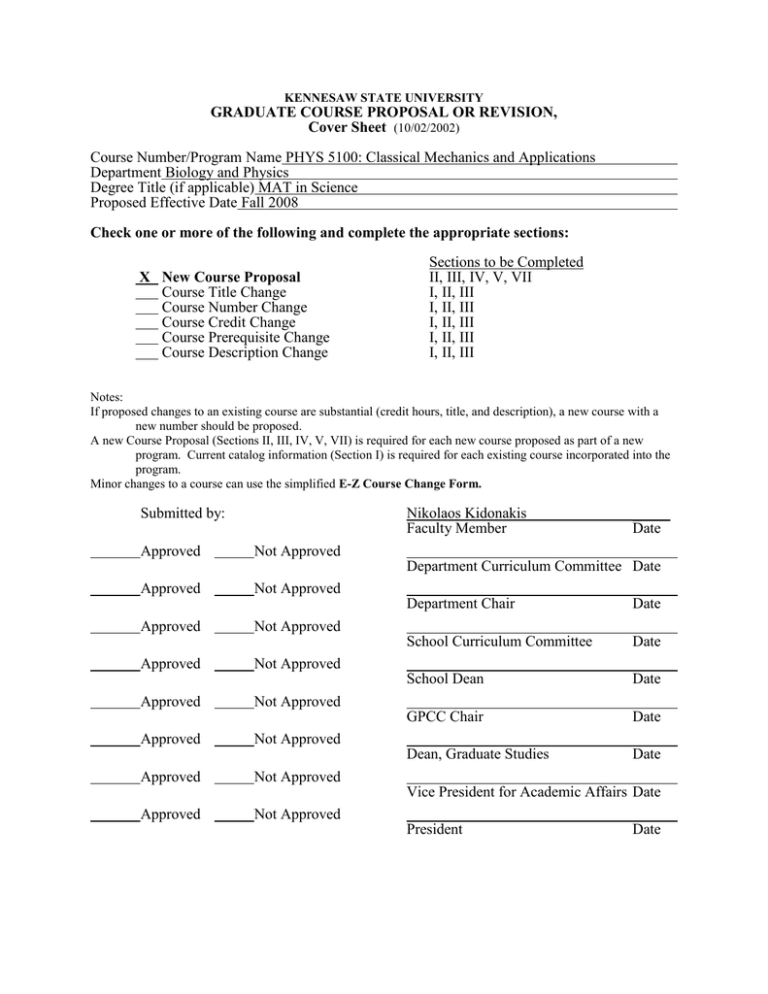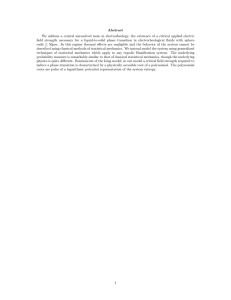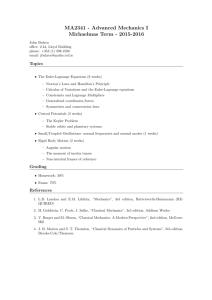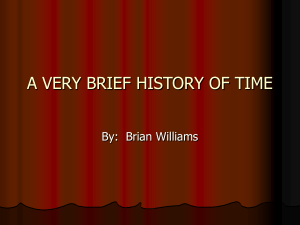GRADUATE COURSE PROPOSAL OR REVISION, Cover Sheet
advertisement

KENNESAW STATE UNIVERSITY GRADUATE COURSE PROPOSAL OR REVISION, Cover Sheet (10/02/2002) Course Number/Program Name PHYS 5100: Classical Mechanics and Applications Department Biology and Physics Degree Title (if applicable) MAT in Science Proposed Effective Date Fall 2008 Check one or more of the following and complete the appropriate sections: X New Course Proposal Course Title Change Course Number Change Course Credit Change Course Prerequisite Change Course Description Change Sections to be Completed II, III, IV, V, VII I, II, III I, II, III I, II, III I, II, III I, II, III Notes: If proposed changes to an existing course are substantial (credit hours, title, and description), a new course with a new number should be proposed. A new Course Proposal (Sections II, III, IV, V, VII) is required for each new course proposed as part of a new program. Current catalog information (Section I) is required for each existing course incorporated into the program. Minor changes to a course can use the simplified E-Z Course Change Form. Submitted by: Approved Nikolaos Kidonakis Faculty Member _____ Date Not Approved Department Curriculum Committee Date Approved Approved Approved Approved Approved Approved Not Approved Department Chair Date School Curriculum Committee Date School Dean Date GPCC Chair Date Dean, Graduate Studies Date Not Approved Not Approved Not Approved Not Approved Not Approved Vice President for Academic Affairs Date Approved Not Approved President Date KENNESAW STATE UNIVERSITY GRADUATE COURSE/CONCENTRATION/PROGRAM CHANGE I. Current Information (Fill in for changes) Page Number in Current Catalog Course Prefix and Number Course Title Credit Hours Prerequisites Description (or Current Degree Requirements) II. Proposed Information (Fill in for changes and new courses) Course Prefix and Number _________PHYS 5100______________ Course Title _______ Classical Mechanics and Applications Credit Hours 3-0-3 Prerequisites Admission to MAT program and a "C" or better in Math 2202 and Phys 2212 (or equivalent)". Description (or Proposed Degree Requirements) This course provides a modern coverage of topics in classical mechanics, including a deeper understanding of the dynamic laws and a focus on connections to other topics in physics and to real life applications of the topics. Topics include a review of Newton's laws of motion which is followed by an examination of conservation laws in physics, Newton's theory of gravitation, the two-body central force problem, the Lagrangian and Hamiltonian frameworks, and a study of simple harmonic motion and oscillations. Connections with other fields of physics and to applications are made when appropriate to broaden, deepen, and strengthen students' physical insights and understanding. III. Justification This course will be needed for the proposed MAT in Science program. One of the primary objectives of the MAT program is to provide prospective teachers with the appropriate depth and breadth in their subject area so that they are fully prepared to convey current, in-depth, and accurate content knowledge to their students. PHYS 5100 is intended to deepen and broaden the graduate students’ understanding of the laws of classical mechanics including motion, energy and oscillations, and how to apply these laws to explain the operation of everyday devices and highlight the role of classical mechanics in natural phenomena. This course will be also of value to undergraduate students in Mathematics & Chemistry who wish deepen their content knowledge in preparation for Graduate school or other technical careers. IV. Additional Information (for New Courses only) Instructor: Nikolaos Kidonakis Text: Classical Mechanics by John R. Taylor Prerequisites: Admission to MAT program and a "C" or better in Math 2202 and Phys 2212 (or equivalent)". Objectives: I. Knowledge and Conceptual Objectives: A solid understanding of Newton’s laws of motion. An in-depth study of conservation laws: energy, momentum, and angular momentum. An understanding of simple harmonic motion and its relevance for describing a wide range of physical systems. An introduction to the calculus of variations. An introduction to the Lagrangian, Lagrange’s equations and their application to a wide variety of problems. Understanding of the two-body central force problem. An introduction to the Hamiltonian framework of classical mechanics. Understanding of oscillations and normal modes. An introduction to collisions and cross sections. II. Skills Objectives Be able to understand and work with Newton’s Laws of Motion Demonstrate the ability to understand and relate various physical situations. Understand and use units and dimensional analysis in the context of classical mechanics. Demonstrate the ability to explain simple classroom demonstrations of dynamics and oscillations. Demonstrate the ability to develop lesson plans focused on topics in classical mechanics. Gain proficiency at searching the physics education research literature, for relevant information about teaching these topics. Gain an in-depth understanding of the most prevalent student misconceptions on a given fundamental physics concept or topic and write a lesson that would promote the conceptual change of their future students. Instructional Method Lecture Method of Evaluation Projects 16% Tests 60% (3 tests, 20% each) Final Exam 24% Grades: A >90%; B 80%-90%; C 70%-80%; D 60%-70%; F <60% V. Resources and Funding Required (New Courses only) Resource Amount Faculty Initially none. A new faculty line might be needed if enrollment will result in current and proposed courses reaching capacity. Other Personnel None Equipment None Supplies None Travel None New Books New Journals Other (Specify) TOTAL Funding Required Beyond Normal Departmental Growth None VI. COURSE MASTER FORM This form will be completed by the requesting department and will be sent to the Office of the Registrar once the course has been approved by the Office of the President. The form is required for all new courses. DISCIPLINE COURSE NUMBER COURSE TITLE FOR LABEL (Note: Limit 16 spaces) CLASS-LAB-CREDIT HOURS Approval, Effective Term Grades Allowed (Regular or S/U) If course used to satisfy CPC, what areas? Learning Support Programs courses which are required as prerequisites Physics 5100 Mechanics 3-0-3 Spring 2009 Regular APPROVED: ________________________________________________ Vice President for Academic Affairs or Designee __ VII Attach Syllabus See attached.


